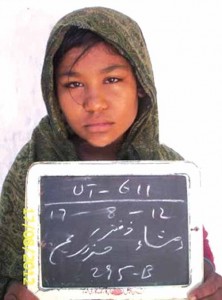LAHORE, Pakistan (Morning Star News) – As of late Tuesday night in Pakistan there were no reports of Islamic extremist unrest following today’s dismissal of blasphemy charges against a Christian girl in Islamabad.
Accusations of blasphemy in Pakistan commonly involve clamoring crowds of Islamists, but extremists appeared resigned that the case against Rimsha Masih had little likelihood for success. With a medical report showing her mental age was younger than her 14 years and her accuser himself accused of desecrating the Koran in an attempt to concoct evidence against her, Rimsha received an outpouring of international support.
“This is a highly sensitive matter, and one must be extremely careful while leveling such charges against anyone,” Chief Justice Iqbal Hameedur Rehman of the Islamabad High Court said in a 15-page judgment. “Fake allegations should not be leveled against any Muslim or non-Muslim.”
Rehman declared that Rimsha had not committed blasphemy as alleged by cleric Qari Khalid Chishti, also known as Khalid Jadoon Chishti, and the original complainant of the case, Malik Hammad. Chishti was later accused of adding burnt pages of the Koran to a bag of ashes that Rimsha had carried.
Rimsha’s lead lawyer, Tahir Naveed, told Morning Star News that the verdict set a precedent for courts and police to examine such cases carefully to ensure that justice is served.
“The police have withdrawn the charges and quashed the case against Rimsha – it is a historic day indeed and will help in forming consensus on how to stop misuse of the blasphemy laws,” Naveed said.
The lawyer said the evidence in favor of Rimsha was so overwhelming that the court could rule no other way.
“The medical tests proved that she was a minor and that her mental age was less than other children of her age,” he said. “The testimonies of the witnesses against Jadoon also helped in unearthing the plot.”
Before her case was transferred to juvenile court, initially the girl was charged as an adult, in which case the charge of desecrating the Koran would have carried a life sentence, 25 years in Pakistan.
Though there was no reaction from Muslim extremists as of late Tuesday night, some Pakistani Christians were skeptical about the long-term implications of the verdict.
“Radicalization in Pakistani society is quickly multiplying, and this is breeding militancy,” said Napolean Qayyum, field director of advocacy group World Vision in Progress, which helped Rimsha obtain bail. “Intolerance has always been there, but it has worsened after 9/11.”
Rimsha is still in hiding because no one can guarantee her safety, he added.
“People accused of blasphemy seldom are able to return home alive,” Qayyum said. “This points to the bigger problem in our society. Just a couple of years ago, two Christian brothers accused of blasphemy were shot dead on court premises when the complainant Muslims sensed that they would be acquitted by the court.”
The case should alert judges that in most cases, blasphemy charges are leveled out of personal vendettas and prejudice, he said.
Pakistan’s blasphemy law requires intent in order for prosecution to be successful, and the judge’s ruling noted that investigators concluded that Rimsha “was completely unaware of the religious feelings of Islam and Christianity.”
Without willful intent by a girl who had no awareness of the effects of defiling pages or an extract of the Koran, the judge declared, “how she by any stretch of imagination could be charged for the offence under Section 295-B PPC, and allowing the trial of the petitioner, especially when she was already found innocent by the investigating agency and has been left at the mercy of court, would amount to mockery of justice.”
Continuation of the case would be futile and a miscarriage of justice, he stated.
“It would also be a sheer abuse of process of court, which is not permissible under the law,” his judgment reads.
The court had reserved its verdict last week on an application seeking dismissal of the First Information Report against Rimsha.
Most blasphemy case acquittals take place at the appellate level, after courts have denied bail so often that the accused spend years in jail, as lower courts tend to decide based on fear of violence by Islamist groups rather than on merit.
Rimsha, arrested in August, was kept in a high security prison in Rawalpindi, a garrison city outside Islamabad, for more than two weeks. She was granted bail in September when accusations emerged that Chishti, a Muslim cleric, had planted false evidence against her. Residents of Rimsha’s neighborhood of Meher Jafar (also called Meherabadi) said Chishti wanted to force out Christian families in the area, saying that they were “disturbing his call of prayers” with services at a nearby church.
After Chishti was arrested, Rimsha was flown out of the Adiala Jail to an unknown location to ensure her safety and has been in hiding since.
Attorney Naveed said it was impossible to even consider resettling Rimsha and her family to Meherabadi.
“They can’t go back there … It’s not safe now,” he said. “We did plan once to take her to her neighborhood after her bail but had to reconsider the move because of the violent riots in the country because of the anti-Muslim film produced by an Egyptian-American Copt.”
He said they were now considering ways to relocate the family and help them in starting life afresh.
Police have found most blasphemy accusations to be false during investigation, but accusers can make innocent victims suffer months in jail with quick and easy registration of such cases. Of 5,000 cases registered between 1984 and 2004, only 964 people were charged with blasphemy, according to the Pakistani newspaper Dawn. A recent study by the Centre for Research and Security Studies (CRSS) found that from 1953 to July 2012, there were 434 people blasphemy “offenders” in Pakistan, including 258 Muslims, 114 Christians, 57 Ahmadis and four Hindus.
Those acquitted of blasphemy charges also face threats from homicidal vigilantes. Of 52 people extra-judicially murdered after being charged with blasphemy in Pakistan, 25 were Muslims, 15 were Christians, five were Ahmadis, one was Buddhist and one was Hindu, according to the CRSS report.
“The verdict will send out a positive image of Pakistan in the international community that there is justice for all, and that society has risen up for justice and tolerance,” Paul Bhatti, a Christian member of Pakistan’s federal cabinet, said in a statement.
He paid tribute to Muslim scholars, members of the media and civil society for playing a “positive role” in highlighting the injustice done to Rimsha and said it would deter others from leveling false accusations.
###
© 2012 Morning Star News. Articles may be reprinted with credit to Morning Star News.
Tweet: https://twitter.com/morningstarnewz/
Facebook: http://www.facebook.com/MorningStarNews
Morning Star News is a 501(c)(3) non-profit corporation whose mission is to inform those in the free world and in countries violating religious freedom about Christians worldwide who are persecuted for their faith. For free subscription or to make tax-deductible donations, contact [email protected], or send check to Morning Star News, 24310 Moulton Parkway, Suite O # 157, Laguna Hills, CA 92637, USA.
- Police mug shot of Rimsha Masih



Speak Your Mind